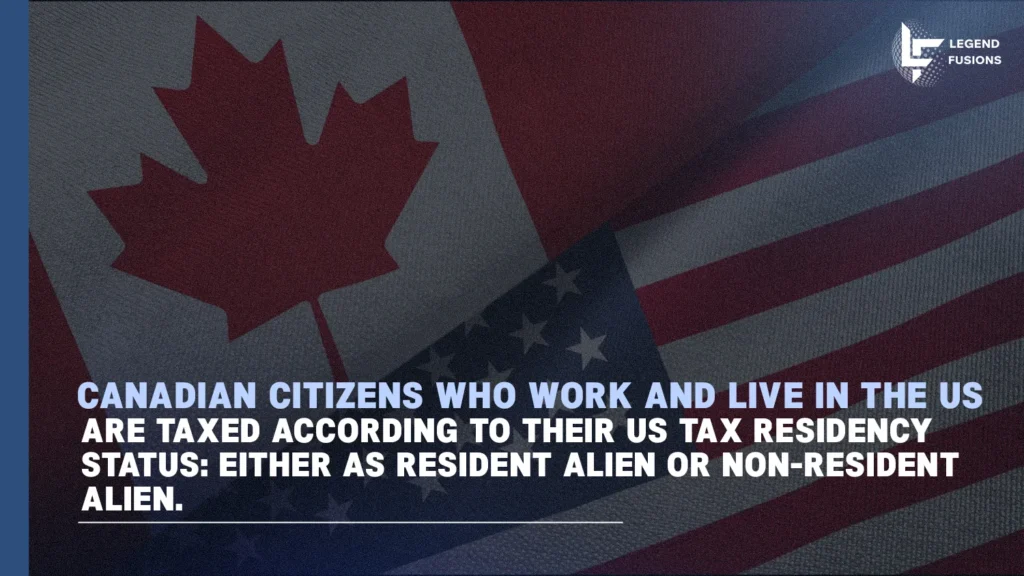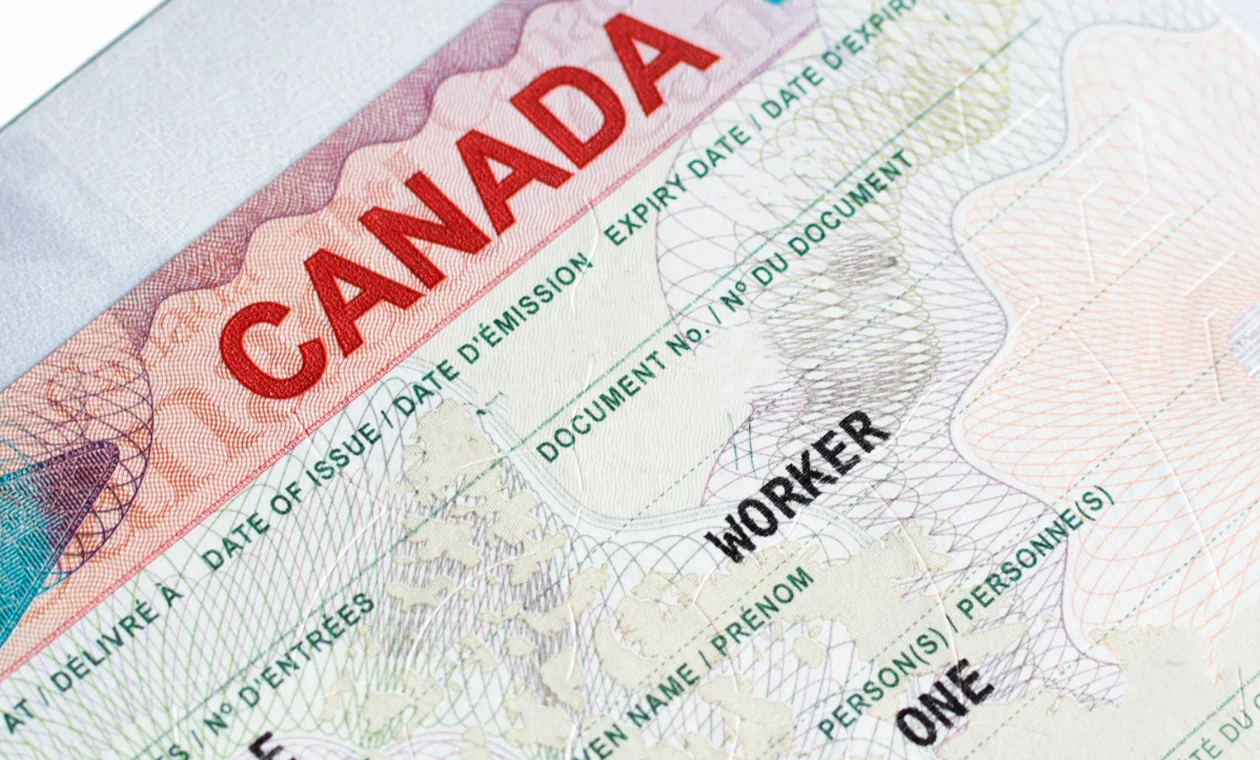Are you a Canadian resident with US income? Whether through employment, rental, property sale, or any kind of business, there is a great chance you owe US taxes. Like many people, you may also fear getting taxed twice, which is a common concern when you earn across borders.
Here’s all you need to know about Canadian citizen working in US taxes and other situations, such as when you also own a US property.
Contents
Understand Your US Tax Status
First off, you need to know that your tax obligations primarily depend on your residency status. For tax purposes, you may be classed as either a ‘Resident Alien’ or ‘Non-Resident Alien’, which will determine how your income will be taxed by IRS.
• Residency for US Tax Purposes
Several tests will help you identify your residency status:
Substantial Presence Test
This is the most common way a Canadian citizen living and working in the US becomes a US tax resident. You generally meet this test if you are physically present in the United States for:
- At least 31 days during the current year, and
- 183 days over a three-year period (current year + 2 prior years), using a specific calculation (current year days x 1 + first prior year days x 1/3 + second prior year days x 1/6).
Green Card Test
If you are a lawful permanent resident in the US, also called a green card holder, you are automatically considered a Resident Alien for US tax purposes.
First-Year Choice
In certain situations, if you meet the Substantial Presence Test in the year following your arrival but not in the year of arrival, you might be able to elect to be treated as a resident for part of your first year. This can impact your initial tax years.
• Non-Resident Alien vs. Resident Alien
Your residency status will determine how you will be taxed:
A. If You Are a Resident Alien
This means you passed the Substantial Presence Test or Green Card Test. The IRS will generally tax you on your worldwide income, like with US citizens. All your income, no matter where it comes from, is subject to US taxation.
B. If You Are a Non-Resident Alien
If you do not meet either test, you are usually taxed only on your US-sourced income. This often applies to Canadian residents with US income who spend limited time in the USA but earn from US sources.

Tax Filing for Canadians Working in the US
Once you determine your tax residency status, learn about your tax obligations and Canadian filing US tax return requirements.
• Your Tax Labilities in the US
US employees are generally subject to payroll taxes, also known as FICA taxes, which consist of Social Security and Medicare.
Most states in the US also have their own state income tax, and some localities may have local taxes. Your liability for these depends on where you work and reside within the USA.
• Filing Your US Tax Return
Your employer will typically withhold federal, state, and local taxes directly from your payroll. However, if you are self-employed, you file tax forms as follows:
- Form 1040 (U.S. Individual Income Tax Return) — if you are considered a US Resident Alien; this is your primary federal income tax form (used to report all your worldwide income to the IRS)
- Form 1040-NR (U.S. Nonresident Alien Income Tax Return) — if you are a Non-Resident Alien (used to report your US-sourced income)
What Is the Canada-US Tax Treaty?
The IRS and the CRA have a tax treaty, so you do not get taxed on the same income. This tax treaty determines which of the two countries has the right to tax specific types of income.
Here are what the tax treaty consists of:
• Residency Tie-Breaker Rules
If you meet the residency definitions of both countries under their domestic tax laws (e.g., you meet the US Substantial Presence Test and are also considered a Canadian resident), the treaty provides ‘tie-breaker’ rules to determine which country you are a resident of for treaty purposes. This typically involves looking at your permanent home, centre of vital interests, habitual abode, and nationality.
• Saving Clause
The treaty generally allows each country to tax its own citizens and residents as if the treaty did not exist, with major exceptions for Canadian citizens to avoid double taxation.
• Specific Income Types
The treaty outlines how various types of income (e.g., employment income, business profits, pensions, real estate income) are to be treated, specifying whether one country has exclusive taxing rights or if the other country provides a credit for tax paid.
Another important concept about Canadian citizen working in USA tax are the totalization agreements aimed at preventing double taxation on social security contributions. This ensures you only contribute to one country’s social security system at a time, depending on the duration and nature of your employment.
How to Avoid Double Taxation
Even with the treaty, learn how to proactively prevent double taxation, too:
• Foreign Tax Credit
If you pay tax to the USA on income that is also taxable in Canada, the Canada Revenue Agency (CRA) generally allows you to claim a foreign tax credit on your Canadian income tax return for the US taxes paid.
This credit reduces your Canada tax on overseas income by the amount of US tax paid, up to your Canadian tax liability on that foreign income. The IRS offers a similar credit on Form 1116 for US residents with foreign income.
• Foreign Earned Income Exclusion (FEIE)
This is less common for those directly working and living in the US, but this allows qualifying US citizens or Resident Aliens to exclude a certain amount of foreign earned income from US taxation if they meet specific residency tests. This is more relevant for US citizens working abroad, however.
What If You Own US Real Estate?
Do you own real estate in the US, too, while working? Or you may have bought vacation properties in the warmer parts of the US to rent them out once you are back to Canada. If you own a US property, whether rented or sold, you will have to face US taxes.
One exception with rental is if you rent out vacation property for less than 15 days a year. Your tax implications depend on what you are doing with your US real estate.
• Tax on Rental Income from Your US Property
You generally have two main options to settle your rental income tax. The first is a flat 30% US withholding tax on gross rent, collected by your tenant/manager, which helps you avoid the need to file a US income tax return.
The second, generally more tax-efficient, option involves electing to treat income as effectively connected to a US business, filing a Form 1040NR, and paying tax on net rental income at graduated US income tax rates after deducting expenses.
• Tax on Sale of Your US Property
There are also 2 main tax implications when you sell your US property as a Canadian citizen. First, a 15% US withholding tax (FIRPTA) on gross sale proceeds is generally applied at transfer, though exceptions exist.
Second, you file a US non-resident tax return (Form 1040NR) to report the sale’s components, including capital gains and depreciation recapture, to determine your final US tax liability.
Cross-border property sales can be very complex. Be sure to reach a cross-border tax specialist in this case.
Tax Help for Canadian Citizen Working in US Taxes
Canadian citizen working in US taxes is a concern usually assisted by cross-border accountants, as they specialize in tax treaties between countries. This is where Legend Fusions come in. Our Canada-US tax accountant can help you understand your tax obligations better, streamline your filing, and take advantage of any hidden savings. Talk to our cross-border tax specialist today!

Jeffrey Ross
Jeffrey Ross is an experienced tax accountant focused on US-Canada cross-border taxation, with over three years in the industry, including a key role as client manager at a Canadian tax firm. He provides expertise in corporate and personal tax planning, specializing in non-resident tax, capital gains, CRA and IRS compliance, and retirement planning. Known for his personalized approach, Jeffrey is dedicated to guiding clients with clear, practical advice tailored to complex tax scenarios, aligned with the evolving tax laws.

